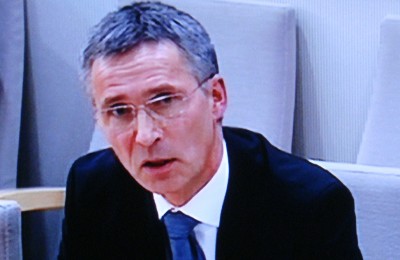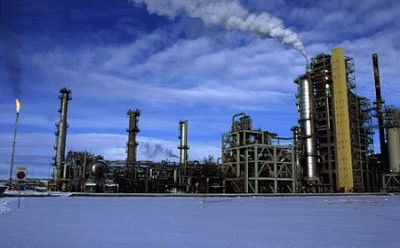NEWS ANALYSIS: Former Prime Minister Jens Stoltenberg failed to deliver on his vision of full-scale carbon capture at Statoil’s controversial Mongstad plant on Norway’s west coast. He was unrepentant under tough questioning in Parliament this week and now faces, as one local commentator wrote on Tuesday, a full-scale scandal.

Stoltenberg, who was just appointed as a UN Special Envoy on climate issues, has already spent years trying to get other countries to reduce their carbon emissions. His track record at home does not set a good example, as Norway’s oil and gas industry continues to leave the country with high levels of emissions per capita.
What’s at issue in Norway now, however, is how Stoltenberg and his government handled – some say bungled – their expensive plans to demand carbon capture and storage at Mongstad. Stoltenberg’s Labour Party and especially his government partners, the Center Party and the Socialist Left (SV), claimed they also would develop a much-vaunted test center at Mongstad to develop the technology for such operations and test various methods of carbon capture that could be used at Mongstad and other refineries and power plants around the world.
The Mongstad carbon capture project, which Stoltenberg famously called “Norway’s moon-landing” in his New Year’s Eve address to the nation in 2007, was also meant to justify construction of the facility at Mongstad, which was supposed to have carbon capture and storage from its first day of operations. Instead, the government’s demand was diluted and its plans kept getting postponed, allowing Statoil to operate the plant without the climate measures. Commentator Hege Ulstein wrote in newspaper Dagsavisen on Tuesday that no one has control over Mongstad’s emissions today.

Last September, conveniently just a week after the national election on September 9, the state auditor general (Riksrevisjonen) released a highly critical report about how Stoltenberg and his government partners had managed the project and controlled its costs. Questions flew over why the auditor’s report wasn’t released when it reportedly was actually finished, before the summer holidays, and suspicions rose that the government parties didn’t want its bad news to interfere with their re-election campaign, which they lost anyway.
Then, just a few days after the auditor’s damning evaluation of the Mongstad project, ministers from SV and the Center Party (who headed the Oil & Energy and Environmental Protection departments respectively) announced that the government had decided to drop the entire project involving full-scale carbon capture and storage. Only the test center remained.
Critics immediately charged that the two ministers were taking the fall for Stoltenberg. Now, four months later, they had lots of questions for Stoltenberg at a special hearing called by the parliament’s disciplinary committee on Monday. Stoltenberg refused to answer many of them.

“Aren’t you even just a bit disappointed? Won’t you accept any criticism?” pressed the leader of the hearing, MP Abid Raga from the Liberal Party (Venstre). No, Stoltenberg held firm that he hasn’t done anything wrong.
Stoltenberg repeatedly claimed that development of the test center “was always the most important,” not the actual carbon capture and storage to reduce Mongstad’s emissions. He pointed out that the test center is in full operation and that it alone “still deserves the description as a moon-landing.”
Stoltenberg claimed the costs of moving forward with construction of a full-scale carbon capture and storage facility simply got too high, and suggested his government should be praised for halting the project and not throwing more good money after bad. “The costs were first estimated at NOK 5 billion (SD 800 million), today they’re NOK 25 billion,” Stoltenberg told members of the discplinary committee. That itself is a matter of dispute, though, as is what’s already been spent. Newspaper Bergens Tidende reported that NOK 10 billion has actually been spent at Mongstad, according to letters from the oil & energy ministry, not the NOK 7.4 billion claimed by the state auditors and which Stoltenberg has acknowledged.
Nor does Stoltenberg agree that the Parliament should have been informed earlier that the government was considering halting the project, and then that it planned to do so.
“We stopped the project before we started using money on something we couldn’t defend,” Stoltenberg said. He refused to reveal internal discussions within his government coalition. Some MPs said that SV especially should have felt let down by Stoltenberg and the whole debacle. SV had agreed to move forward with the Mongstad plant on the proviso that emissions would be cleaned of their carbon. Former SV leader and finance minister at the time, Kristin Halvorsen, had said she could promise “with my hand on my heart” that carbon capture and storage would be in place by 2014. That won’t happen.
Scathing criticism of Stoltenberg
Some MPs were scathing in their criticism of Stoltenberg. “He is consciously avoiding admitting to anything detrimental, he still puts everything in a fine light,” Raja told newspaper Aftenposten. “A former prime minister shouldn’t do that. He should accept criticism that his government did not succeed with its full-scale project. He should dare to say that a lot of money has been spent without achieving the results intended.”
MP Michael Tetzschner of the Conservative Party said that Stoltenberg “chooses to portray old projects as if they were a success when in reality they were the opposite.” MP Rasmus Hansson of the Greens Party MDG said he was “shocked” over some of Stoltenberg’s statements, claiming it was wrong for his government to dump the project and then give parliament what Hansson called an “inadequate” reason for doing so.
Bum deal with Statoil
Statoil chief executive Helge Lund, meanwhile, confirmed that Mongstad was built to Statoil’s specifications and not with the thought that a carbon capture and storage facility would be integrated into it. “It was clear from the start that it would have been complex and demanding to carry out,” Lund told Dagsavisen. Some commentators claim the state simply got stuck in a bum deal with Statoil, which never seemed enthusiastic about capturing carbon and later claimed the process would contain health risks, which Stoltenberg accepted. Other state authorities later downplayed or even dismissed such risks.
It was not a good day in Parliament for Norway’s former prime minister who now leads its opposition as well as traveling the world on behalf of UN climate issues. It’s unclear whether the Mongstad “scandal” will affect Stoltenberg’s credibility as a climate envoy. Norway’s chances of meeting its own climate goals, meanwhile, remain a huge challenge.
newsinenglish.no/Nina Berglund

